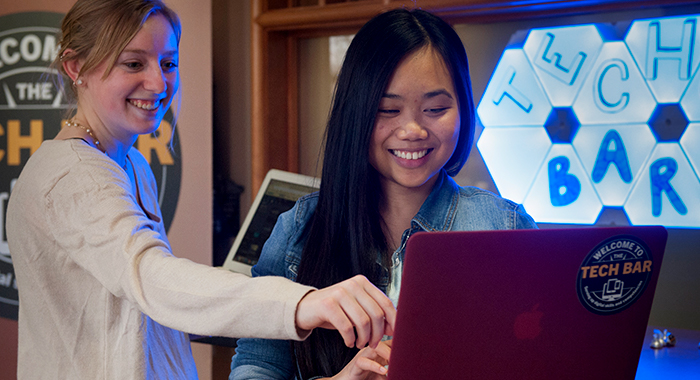New ‘Tech Bar’ Works to Boost Students’ Digital Know-How
From academic help to health checkups to support for personal or spiritual well-being, students at St. Norbert College can access a number of on-campus resources throughout the year.
To give an idea of what’s available day-to-day, here are a few they can choose from: the Writing Center, the Research Center, Academic Support Services, Health & Wellness, Counseling & Psychological Services, and the Emmaus Center, among others.
But now students can add one more to that list: the Tech Bar.
Digital Skills in a Liberal Arts Education
The Tech Bar, which opened this fall in Todd Wehr Hall, is a new consulting service from Information Technology Services (ITS).
Students, faculty and staff can stop by or schedule an appointment with a digital consultant, a student hired and trained through ITS. They work with the consultant to learn and develop important digital skills, such as creating videos, editing audio, designing a blog, building a domain, digital mapping and more.
“Our first thought was how can we help our students become better digital entrepreneurs? How can they be aware of tools that help them build the digital skills they need to be successful in class, on campus and beyond?” says Ben Hommerding (ITS), an instructional technologist on the Academic Technology team.
While the ITS Service Desk is already well known for its radical hospitality and customer service on campus, there was a need for something dedicated to the digital liberal arts – a more focused development of the whole person in areas of digital literacy and identity.
“Our service desk is incredibly helpful, but it’s mainly a transaction where we troubleshoot problems with Wifi, computers, laptops and other devices.” says Hommerding. “We saw an opportunity for a more targeted, collaborative approach with students.”
The Tech Bar aims to increase students’ overall digital expertise as a part of SNC’s liberal arts education, and even though it’s in its infancy, its goals are two-fold:
- to provide a more cohesive way for students to develop themselves in a co-curricular fashion within the digital liberal arts.
- to help students positively and clearly explain and promote these digital skills to future employers, in postgraduate school, for volunteer opportunities and more.
Hommerding and the rest of his team believe these types of situations are already happening in smaller pockets on campus, but they want to get a handle on where and how it’s happening.
So partnering with faculty in the classroom was the logical first step. The Academic Technology team regularly works with faculty members who have digital or technological needs related to course design, curriculum planning and class assignments.
By showcasing their new services in these interactions, they hope to gain momentum and find additional opportunities for the Tech Bar.
“With these services, faculty and staff don’t need to be the main support for students when it comes to knowing these digital tools,” says Hommerding. “They can focus on the providing content and feel more comfortable assigning projects that stretch digital skills.”
Building Knowledge on Both Sides
While the digital consultants focus on helping their peers develop digital skills and recognize the importance of doing so, they are learning just as much, if not more.
“Our consultants have already gained a ton of digital knowledge,” remarks Hommerding. “They are adept at video editing, they can design infographics, they can generate digital maps and they understand domain creation, to name a few.”
Each consultant is Google educator-certified and is expected to continuously learn and experiment with new tools. This gives them the foundational knowledge to help others traverse any initial hurdles that may pop up during a project.
And after an appointment, the consultant sends a confirmation email with feedback on what they worked on, tips to remember and a recommendation for a follow up appointment, if necessary. When the working session is related to an academic project, a copy of the email is sent to the professor, too.
But Hommerding stresses that while the Tech Bar is here to help students achieve academic success, they are encouraged to bring personal projects, whether it’s a blog, a new website, a need for a domain, a video project, etc.
So far, students and faculty who’ve worked with the Tech Bar have highly recommended it and tout its importance on campus. And this is just the beginning: “We’re still discovering how it’ll fit on our campus and what we can do to make it successful so that people know what it is, where it is and how it works,” says Hommerding.
Spring semester will reveal some new changes, which will be implemented when students return. The team plans to relocate the Tech Bar to Cofrin Hall in order for student consultants to be closer to the main ITS department. They’re also considering a shift in some operating hours to accommodate students’ busy schedules.
Plus, the team will be doing workshops and trainings for student workers and assistants across campus, including the Mulva Library and Academic Support Services.
Those interested in learning more about the Tech Bar or discovering opportunities to work with them can visit their website or contact Hommerding at ben.hommerding@snc.edu or 920-403-3973.
March 6, 2018












